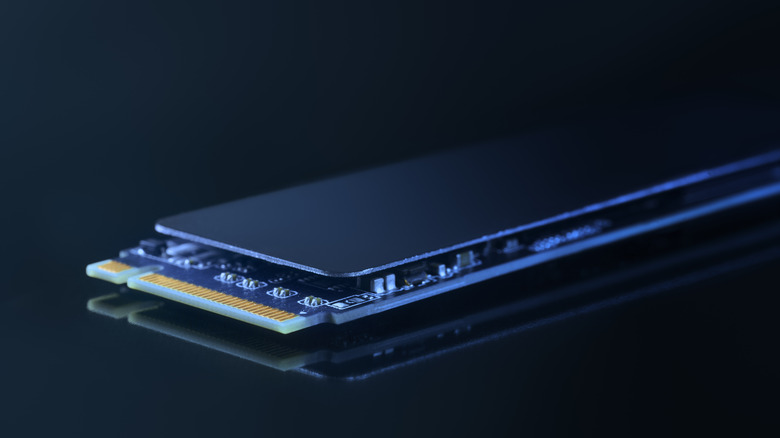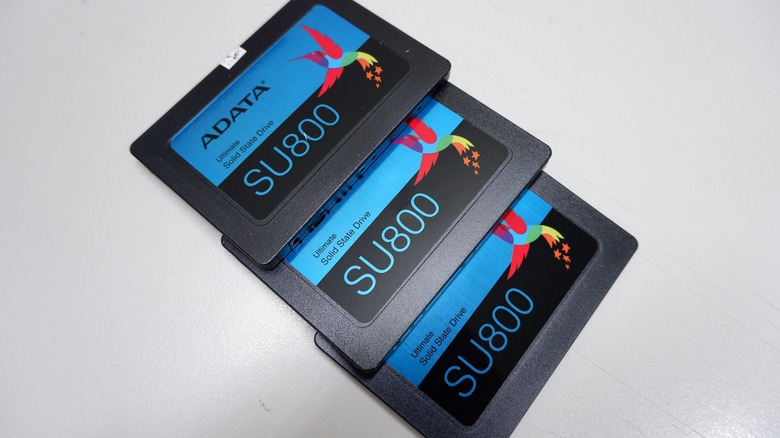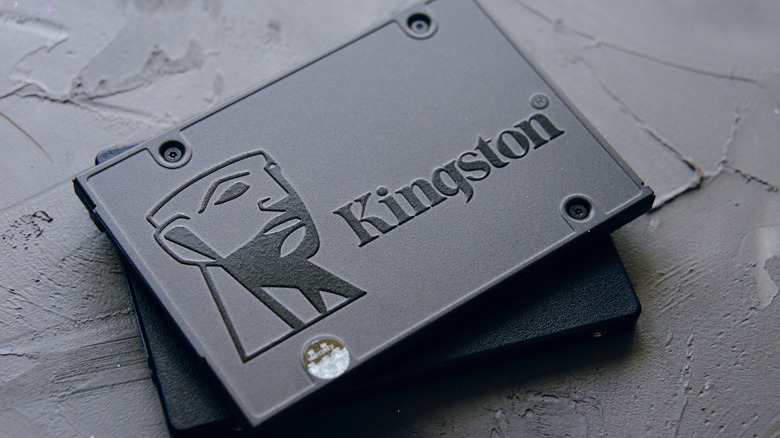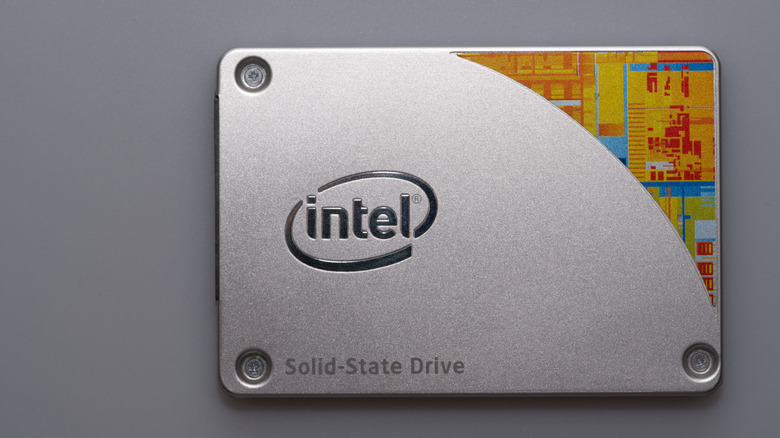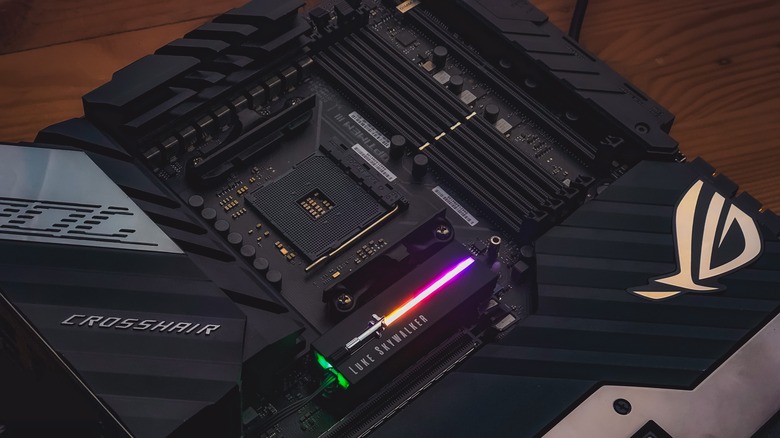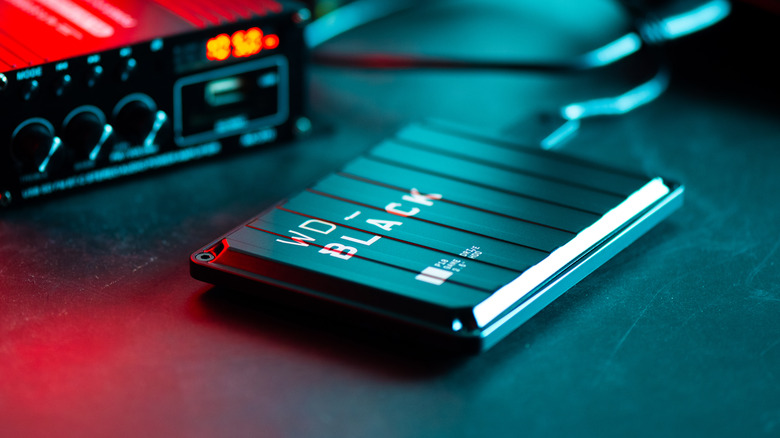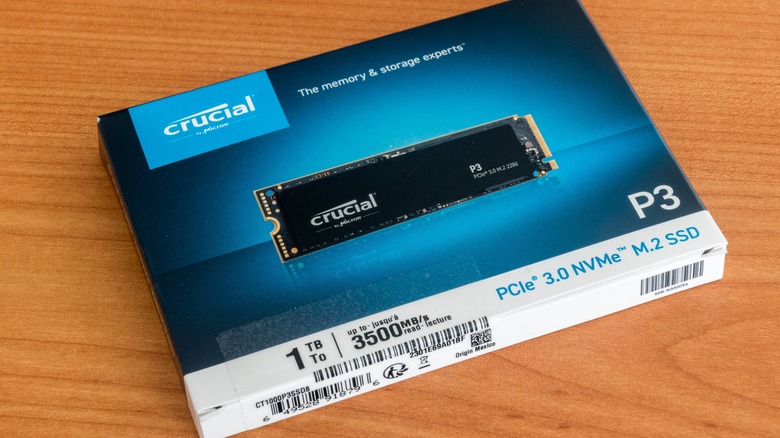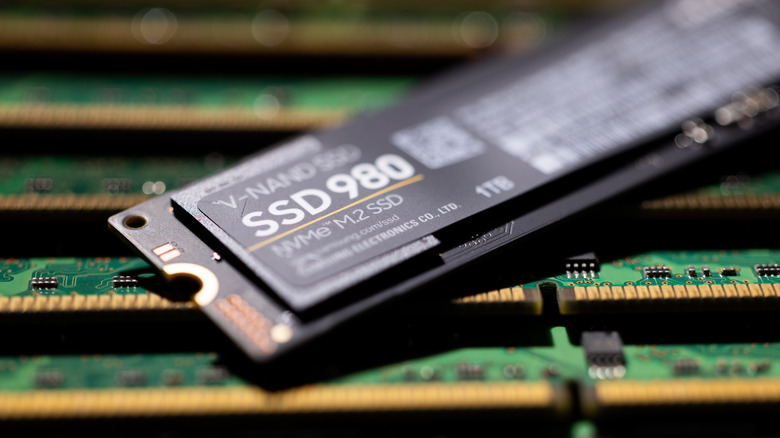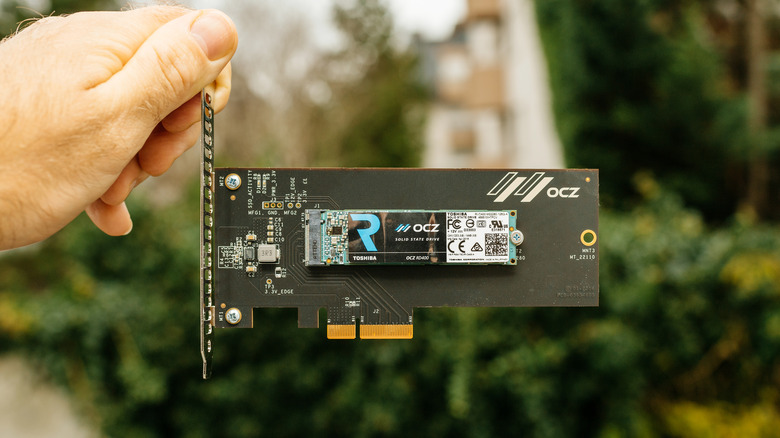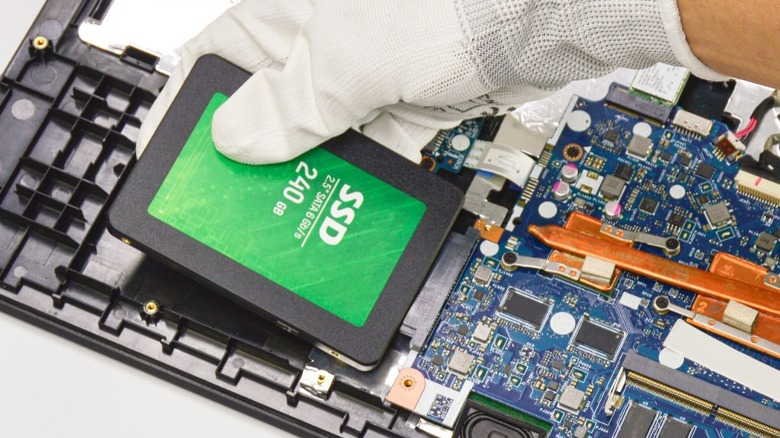Major SSD Brands Ranked Worst To Best (And Which Ones To Avoid)
We may receive a commission on purchases made from links.
For many years, the hard drive was the most effective way of storing content on a computer or electronic device. While there were many other formats, the standard hard drive was the storage solution of choice for those who needed to save and load lots of data. But the day of the hard drive is coming to a close thanks to the advent of the solid-state drive. Also known as an SSD, this storage medium has several advantages over its precursor. It is faster, more reliable, and more energy efficient, largely because it doesn't have moving parts and instead relies on flash memory.
These enhancements have made SSDs more and more widespread in recent years. Modern game consoles such as the PlayStation 5 and Xbox Series X|S use SSDs to allow for super fast loading times, while most new laptops and computers come with them fitted as standard rather than hard drives. With SSDs becoming so ubiquitous, there's also an ever-growing list of manufacturers producing their own models.
When it comes to SSDs, though, certain brands stand out among the rest for their quality and reliability. Here, we've ranked the best of the best when it comes to SSD brands and outlined just what makes them so good. As an added benefit, there's also advice on the SSD brands that buyers should avoid if possible. Qualities taken into consideration for the following ranking include range of products, pricing vs. value, availability, and user feedback.
7. ADATA
Probably best known for its dynamic RAM range, ADATA is a Taiwanese manufacturer that has found most of its success in Asia. It is now beginning to establish a strong presence in other parts of the world, competing directly against the likes of Samsung and Western Digital in the SSD market. However, it is not a brand of SSDs that is likely to be top of the charts in terms of performance or speed. That's because this company focuses entirely on affordability, with its products often being cheaper than its rivals to offer customers a budget option. That doesn't necessarily mean that ADATA SSDs are below par, though, but they are never going to be the best of the best.
ADATA has an extensive range of SSDs, ranging from smaller 120GB models all the way up to 4TB releases. The company supports various interfaces and connector types, such as M.2, 2.5 inch, PCle 5.0, and SATA. Almost all of them have received impressive reviews for their durability and wide compatibility. Users of online forums have generally praised the way ADATA SSDs can last a long time and are normally reliable storage solutions for a large array of purposes.
6. Kingston
Kingston SSDs may be more expensive than many models from competitor brands outside of premium manufacturers such as Samsung, but that extra money is almost always worth it. The company has developed a good reputation for producing good SSDs, with many of its models able to match the speeds and reliability offered by other brands. Kingston has something for everybody when it comes to SSDs.
There's the Fury Renegade for those who want to get the most value for their money, as it has an affordable price and excellent mid-tier performance. The company also has the XS2000 as a portable and rugged solution capable of resisting water and dust, making it a good choice for those in less-than-forgiving environments. In terms of capacity, Kingston has SSDs ranging from 120GB to 4TB and supports form factors such as 2.5", M.2, and mSATA. Of course, these SSDs don't quite compete with some of the more high-end options on the market but will be good enough for most customers.
Kingston Technology began life in 1987 and has specialized in memory and storage solutions throughout its history. So you can be sure that this is a brand that knows what it is doing. With fairly positive reviews for its customer service and a standard warranty period of three years, users shouldn't have any issues if they have a problem with a Kingston SSD.
5. Intel
When thinking of an SSD brand, Intel is unlikely to be a company that immediately springs to mind. Despite being a huge player in the computing and technology industries, the company is probably most famous for its microprocessor, graphics cards, and computing components other than storage solutions. However, Intel has been involved in flash memory for some time and was one of the early adopters of static and dynamic RAM. In more recent times, the brand has expanded into producing SSDs to great success. Intel now has almost a 12% market share of global SSD sales, with revenue of more than $3 billion — with only Samsung, Western Digital, and Kingston ahead of it.
Intel SSDs are widely viewed as some of the most reliable and durable available, even if the specs of most of the brand's range can't directly match the best offerings from companies such as Samsung. Although pricey, the likes of the Intel SSD 670p are seen as great solid-state drives, while the Optane DC P5800X is highly regarded as one of the fastest SSDs on the market. When it comes to warranty periods, Intel has different limits for each of its models, although the premium Optane line comes with a standard five-year warranty to give gamers peace of mind. Online reports from Redditors suggest that Intel also has very good customer service as well.
4. Seagate
Seagate has consistently been one of the biggest brands in the data storage industry since its formation in 1979. For much of its history, the company has been at the forefront of hard drive technology and was instrumental in the development of the 5.25-inch HDD and the ST-506 and ST412 interfaces, all of which became industry standards and were used in almost every PC at the time. A 2022 report estimated that Seagate had a 43% market share for HDDs, an indication of just how important the brand is in terms of memory and data storage.
However, Seagate doesn't have anywhere near as dominant a position in the SSD market, with suggestions that it could account for between 1% and 3% of all SSD sales. Although the brand hasn't reached the same heights as some of its competitors, it is widely viewed as a trusted manufacturer, with its SSDs being some of the most reliable and energy-efficient models available to consumers.
Seagate separates much of its SSD business into three separate lines. The BarraCuda range has received great reviews and is designed for general use, while the FireCuda is aimed at gamers and the IronWolf for business users. Those who do have issues with any Seagate SSDs can feel confident they will be fixed quickly, as customers have spoken positively about fast customer service responses and replacements.
3. Western Digital
Western Digital, often known solely by its initials WD, is a data storage company with a long history in the industry. Founded in 1970, the American brand has been a major player in producing hard drives and memory devices for several decades, cultivating a reputable brand that is well-regarded and trusted by customers around the world. So it makes sense for WD to also be a leading figure in the SSD market thanks to the company's brand recognition and experience.
For the most part, WD SSDs are well-built and durable, meaning they should last a significant amount of time before failing. The brand is also known for its high-quality specifications and fast speeds. This makes any WD SSD a reliable workhorse that fits the bill for most jobs, whether for personal or business use. Despite being best known for its range of budget SSDs, WD has a good variety of products to suit every need. This includes the highly praised Blue 3D NAND alongside the pricier Black SN850X, with high read/write speeds that make it a perfect choice to expand the storage of the PS5.
Estimated to be responsible for around 18% of total SSD sales and have up to 34% of the market share for consumers, WD is among the largest and most popular SSD manufacturers. Only Samsung and Kioxia can rival the brand in terms of sheer numbers, demonstrating just how successful the company has been in selling its SSDs.
2. Crucial
Owned by Micron Technology, Crucial is the brand name used by the company for its consumer products. Since its formation more than 25 years ago, Crucial has been at the forefront of memory and storage technology — it played a big part in introducing DDR RAM to consumers and later being among the first brands to sell SSDs to the general public. In the industry, Crucial SSDs are known for offering great value for money, with high-capacity drives often being very affordable compared to alternatives from other brands. The company typically keeps its products updated with regular firmware updates and produces reliable SSDs that are designed to last.
Crucial is also one of the most user-friendly among major SSD brands. Users can find a wide variety of guides for all of their products and detailed walkthroughs to teach customers how to install SSDs on any PC. The company is also known for its excellent customer service, with an active social media presence to answer questions, in addition to various ways to contact the company through its official site. Most of the brand's SSDs come with a three-year warranty, although some also have five years with added stipulations in terms of write limits.
1. Samsung
Samsung is one of the largest electronic manufacturers in the world, producing everything from smartphones and televisions to wireless headphones and laptop computers. So, while they are not a specialist computing and memory company, Samsung has plenty of brand recognition and decades of expertise. Not only that, but the company has also consistently ranked highly in terms of reputation, ranking near the top of customer polls in the United States. This gives a good indication of just how well the general population thinks of Samsung.
As an SSD brand, Samsung has firmly established itself in the market. As one of the first companies to bring SSDs to customers around the world, it has managed to capture a large market share and is estimated to be one of the biggest suppliers, with a market share of as much as 25%. Throw in a standard warranty of three years and excellent reliability (outside of one or two notable exceptions), and it is hard to go wrong with a Samsung SSD. Although, you will have to pay a little extra for this quality.
Samsung offers a good range of different products to consumers as well. The two most notable lines are the EVO and PRO, which provide great speeds and capacities of up to 4TB. However, there are also models such as the PM9C1a, a highly efficient and tiny SSD that clocks in at a lower price than Samsung's other releases.
Brands to avoid
While the brand may not be as crucial for an SSD as other computer components, those who want to get the best value for their money and ensure they get a quality product that will last are best served by avoiding certain manufacturers. Some red flags include a particularly low price compared to the vast majority of alternatives as well as a short warranty period. Other essential factors to consider when determining the less prestigious brands include the quality of the customer service and whether the storage devices tend to malfunction or fail.
For example, there are numerous warnings from users online on sites such as Reddit about KingSpec SSDs overheating, with some reporting that they have even melted other computer parts. Meanwhile, Sabrent's SSDs typically only come with a standard warranty of just a single year — a problem when so many users have seemingly had issues with various models failing. Even worse, contacting customer service to replace or return faulty SSDs with Sabrent can be complicated.
Other SSD brands that should be avoided include PNY and OCZ. These budget manufacturers don't offer anything exceptional and have faced issues in terms of reliability and failure rate, in addition to slower read/write speeds compared to many other brands that create SSDs. Of course, some users may be willing to accept this risk considering the cheaper cost of these SSDs.
Methodology
Rankings above were made after extensive tabulation of qualities in each brand's SSD product range options, including but not limited to functionality, speed, reliability, special features, pricing, and availability. User feedback, hands-on testing, and industry reviews were considered in the making of this list.
